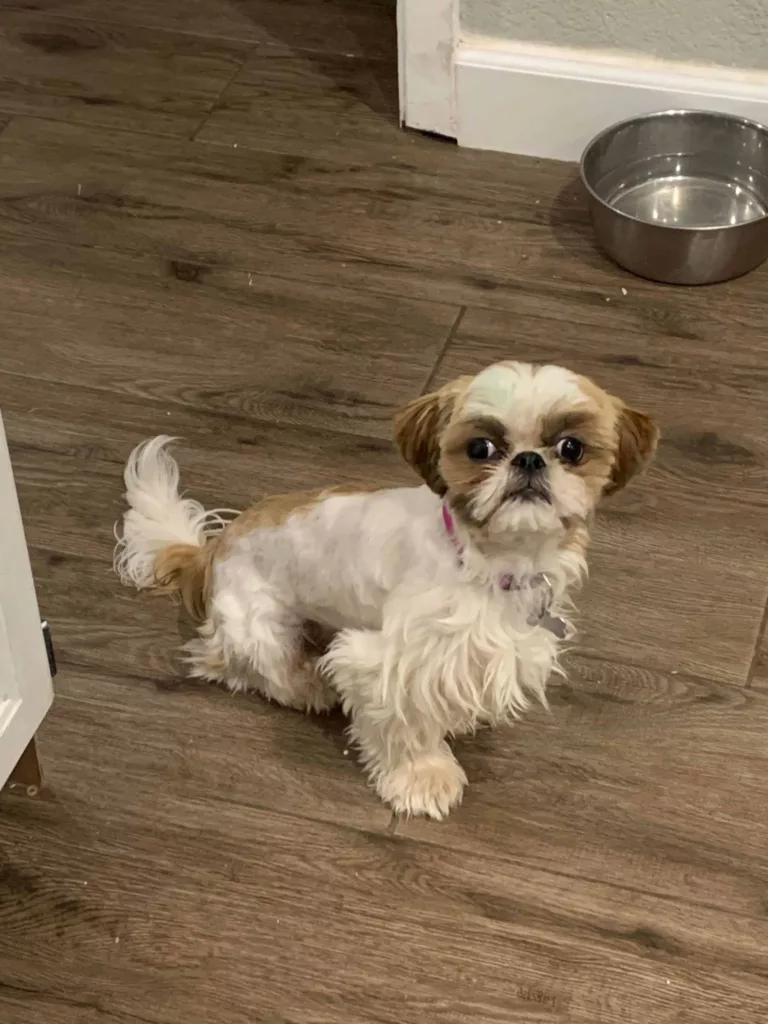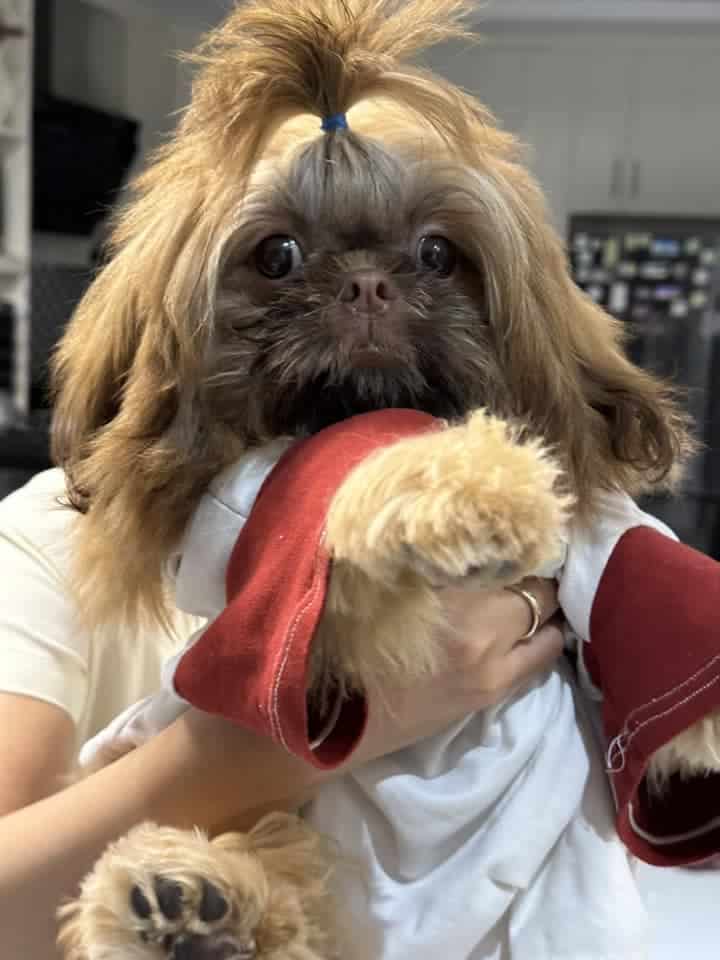Ever wondered why your adorable baby Shih Tzu has crossed eyes? It’s a common concern among pet owners, and in this article, we’ll dive into the fascinating world of canine vision to uncover the reasons behind this curious phenomenon. So, grab a cup of coffee, get cozy, and let’s explore the question on every pet parent’s mind: “Why is my baby Shih Tzu cross-eyed?”
When you first laid eyes on your fluffy little companion, you couldn’t help but fall head over heels in love. Those adorable button eyes stared back at you, capturing your heart in an instant. But as your Shih Tzu grows, you may start noticing a slight misalignment in their gaze. Don’t worry, though! Crossed eyes, also known as strabismus, are relatively common in dogs, including the lovable Shih Tzu breed.
Now, you might be wondering what causes this delightful optical illusion. Is it a sign of a serious health condition or simply a harmless quirk? Well, my friend, get ready to uncover the truth behind those captivating crossed eyes. From genetics to eye muscle imbalances, we’ll explore the various factors that contribute to this unique trait in our furry friends. So, let’s embark on this eye-opening journey together and unravel the mystery of why your baby Shih Tzu is cross-eyed.

Understanding Why Your Baby Shih Tzu is Cross Eyed
Have you noticed that your baby Shih Tzu’s eyes are not aligned? It might be a cause for concern, but don’t worry, cross-eyedness in Shih Tzus is relatively common and usually not a serious issue. In this article, we will delve into the reasons behind why your baby Shih Tzu may be cross-eyed and what you can do to ensure their health and well-being.
Determining the Cause of Cross-Eyedness
When it comes to cross-eyedness in Shih Tzus, there can be several underlying causes. One possible reason is a condition called strabismus, which is characterized by the misalignment of the eyes. Strabismus can occur due to a weak or imbalanced eye muscle. Another potential cause is genetics. Some Shih Tzus may inherit a predisposition for cross-eyedness, especially if it runs in their family line.
Other factors that can contribute to cross-eyedness include trauma or injury to the eye, infections, or abnormalities in the structure of the eye. It’s essential to consult with a veterinarian to determine the exact cause of your baby Shih Tzu’s cross-eyedness. They will be able to assess your pup’s eyes and provide appropriate guidance and treatment options.
Strabismus in Shih Tzus
Strabismus is a common condition in Shih Tzus that can lead to cross-eyedness. It occurs when the muscles that control eye movement are imbalanced, causing the eyes to point in different directions. This condition can be present from birth or develop later in life due to various factors.
Strabismus can be classified into two types: esotropia and exotropia. Esotropia refers to inward turning of the eyes, while exotropia refers to outward turning. Both types can result in cross-eyedness. The condition can be temporary or permanent, depending on its underlying cause. Your veterinarian will be able to provide a proper diagnosis and recommend the most suitable treatment plan for your furry friend.
Treatment and Management of Cross-Eyedness
While cross-eyedness in Shih Tzus may not always require treatment, it is crucial to monitor your pup’s condition and seek veterinary advice if necessary. Treatment options will depend on the underlying cause of the cross-eyedness.
In some cases, surgery may be recommended to correct the misalignment of the eyes. This procedure aims to adjust the eye muscles and bring the eyes into proper alignment. However, not all cases of cross-eyedness require surgical intervention.
Regular Veterinary Check-Ups
Regular check-ups with a veterinarian are essential to monitor your baby Shih Tzu’s eye health. The veterinarian will assess the severity of the cross-eyedness and provide guidance on managing the condition. They may also recommend eye drops or medications to alleviate any discomfort or inflammation associated with the cross-eyedness.
Additionally, keeping your baby Shih Tzu’s eyes clean and free from any irritants is crucial. Gently wipe their eyes with a damp cloth to remove any discharge or debris. Be cautious not to apply any cleaning agents without veterinary approval, as it may cause further irritation or damage to the eyes.
Caring for a Cross-Eyed Shih Tzu

Having a cross-eyed Shih Tzu requires a little extra care and attention. Here are some tips to ensure your furry friend’s well-being:
- Provide a safe and obstacle-free environment to prevent accidents or injuries that could further affect their eyes.
- Keep their eyes clean and free from discharge or debris by gently wiping them with a damp cloth.
- Ensure they receive a balanced diet and regular exercise to promote overall health and well-being.
- Regularly monitor their eyes for any changes or worsening of the cross-eyedness, and consult with a veterinarian if necessary.
Remember, cross-eyedness in Shih Tzus is usually not a cause for alarm. By understanding the underlying causes, seeking veterinary guidance, and providing proper care, you can ensure your baby Shih Tzu leads a happy and healthy life.
Key Takeaways: Why is My Baby Shih Tzu Cross Eyed?
- Shih Tzu puppies can appear cross-eyed because of their facial structure.
- Crossed eyes can also be caused by genetics or eye muscle weakness.
- Most cases of crossed eyes in Shih Tzu puppies improve as they grow.
- If the crossed eyes persist or worsen, it is important to consult a veterinarian.
- Regular eye check-ups and proper care can help prevent and manage crossed eyes in Shih Tzu puppies.
Frequently Asked Questions
1. What causes cross-eyed in baby Shih Tzus?
Cross-eyed or strabismus in baby Shih Tzus can be caused by various factors. One possible cause is a congenital defect in the alignment of the eyes, where the muscles responsible for eye movement are not properly coordinated. This can result in one or both eyes appearing crossed. Another potential cause is injury or trauma to the eye, which can disrupt the normal alignment of the eyes. It is important to have your baby Shih Tzu evaluated by a veterinarian to determine the underlying cause of their cross-eyed condition.
Additionally, certain health conditions such as eye infections or neurological disorders can also contribute to cross-eyed in baby Shih Tzus. Regular check-ups with a veterinarian and proper care can help identify and address any underlying issues that may be causing the cross-eyed appearance.
2. Can cross-eyed in baby Shih Tzus be corrected?
The treatment options for cross-eyed in baby Shih Tzus depend on the underlying cause of the condition. In cases where the cross-eyed appearance is due to a congenital defect, corrective surgery may be recommended. This surgery aims to realign the muscles responsible for eye movement and improve the alignment of the eyes. However, it is important to note that not all cases of cross-eyed in baby Shih Tzus require surgical intervention.
If the cross-eyed appearance is caused by an injury or trauma, the focus will be on treating the underlying issue and allowing the eye to heal. In some cases, the cross-eyed appearance may resolve on its own as the eye heals. Your veterinarian will be able to provide guidance on the appropriate treatment approach for your baby Shih Tzu.
3. How can I prevent cross-eyed in my baby Shih Tzu?
While it may not be possible to completely prevent cross-eyed in baby Shih Tzus, there are certain steps you can take to minimize the risk. Regular veterinary check-ups are essential to monitor your puppy’s eye health and detect any potential issues early on. Providing a balanced diet and ensuring proper nutrition can also contribute to overall eye health.
Additionally, it is important to handle your baby Shih Tzu with care and avoid any activities or situations that may lead to eye injury. Protecting your puppy’s eyes from potential hazards and providing a safe environment can go a long way in preventing cross-eyed and other eye-related issues.
4. Is cross-eyed a common condition in baby Shih Tzus?
Cross-eyed is not considered a common condition in baby Shih Tzus, but it can occur in some individuals. The prevalence of cross-eyed may vary depending on various factors such as genetics, underlying health conditions, and environmental factors. If you notice that your baby Shih Tzu appears cross-eyed, it is important to consult with a veterinarian for a proper evaluation and diagnosis.
Remember that each puppy is unique, and while cross-eyed may be uncommon, it is always important to address any concerns regarding their eye health with a professional.
5. Can cross-eyed in baby Shih Tzus affect their vision?
Yes, cross-eyed in baby Shih Tzus can potentially affect their vision. When the eyes are not properly aligned, it can lead to visual disturbances and difficulties in focusing. In some cases, the brain may suppress the input from one eye to avoid double vision, resulting in reduced vision in that eye. However, the extent of vision impairment can vary depending on the severity of the cross-eyed condition and the underlying cause.
If you suspect that your baby Shih Tzu’s cross-eyed condition is affecting their vision, it is crucial to seek veterinary care promptly. A thorough examination and appropriate treatment can help preserve and improve your puppy’s vision, ensuring their overall well-being.
8 Most Common Shih Tzu Eye Problems
Final Thoughts: Understanding Crossed Eyes in Baby Shih Tzus
After exploring the topic of why your baby Shih Tzu may be cross-eyed, it’s clear that there are several factors that could contribute to this condition. While it may be concerning at first, it’s important to remember that cross-eyedness in Shih Tzus is relatively common and usually not a cause for alarm. By understanding the potential causes and seeking appropriate veterinary care, you can ensure your furry friend receives the necessary support and care.
It’s crucial to consult with a veterinarian to rule out any underlying health issues that may be causing your baby Shih Tzu’s crossed eyes. These professionals can conduct a thorough examination and provide guidance tailored to your specific situation. Additionally, providing a healthy and stimulating environment, along with regular check-ups, can help promote your Shih Tzu’s overall well-being and minimize the chances of eye-related problems.
Remember, each case is unique, and while some Shih Tzus may outgrow their crossed eyes as they mature, others may require ongoing management. By staying informed, seeking professional advice, and showering your furry companion with love and care, you can ensure that they lead a happy and healthy life, regardless of their eye appearance.


